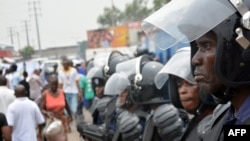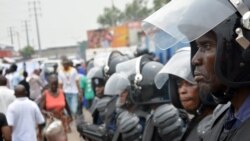Political tensions continue to rise in the Democratic Republic of the Congo ahead of next year’s presidential election following which President Joseph Kabila's mandate is set to expire.
As many as 40 activists, musicians and journalists were arrested in the capital Kinshasa on March 15 during a news conference held to promote greater involvement in national politics by young Congolese. The government accused organizers of inciting insurrection. Intelligence agents and police in the eastern city of Goma also arrested members of the group Struggle for Change, or Lucha, who peacefully protested the Kinshasa detentions. Four Lucha members arrested on April 7 are being held in Goma's central prison on charges of inciting disobedience to public authority.
Earlier this year, at least 42 people died in Kinshasa and other cities protesting a now-abandoned plan to conduct a national census before scheduling the next elections. Activists said such a move would have allowed the president to remain in office for at least three more years as the headcount was conducted across the huge, densely forested nation. President Kabila, who has held office since 2001, is constitutionally barred from running for a third-term in Presidential elections set for November 2016.
The DRC struggled through years of war, which claimed more than five million lives. Strengthening security and political stability is essential for the future of the DRC and the Great Lakes region.
As the DRC enters its electoral cycle, it is especially important that the Government uphold the constitutional rights of all citizens to the freedoms of assembly and expression, and ensure that the electoral process is transparent, inclusive, and peaceful. The credibility of an election depends not only on the day votes are cast, but on the entire electoral process.
Consequently, the United States is deeply concerned by the ongoing detention, without formal charges or regular access to legal counsel, of youth activists by the Government of the DRC. We call on the Congolese leaders to ensure that these detainees, and all detainees, are afforded full due process and released immediately if no charges are warranted.






